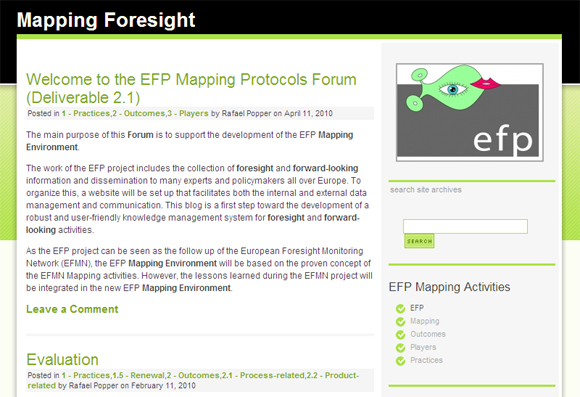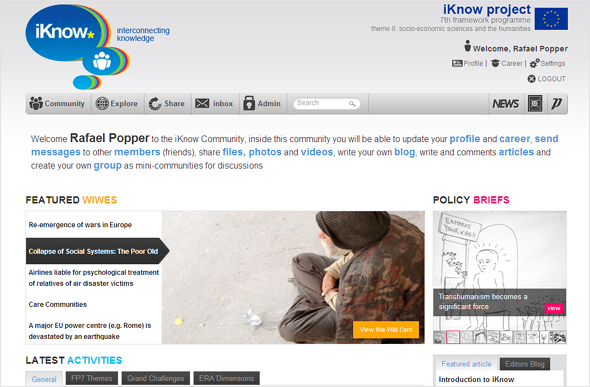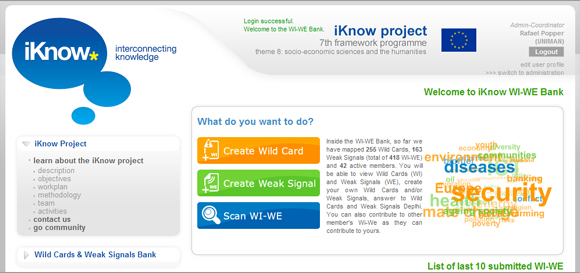Archive
Towards Foresight 3.0
Innovation Radar: How to track down future developments?
Keynote presentation on Innovation Radar: How to track down future developments? at the “5th German Innovation Summit” (Munich, Germany). The Summit was attended by 350 representatives of the private, public and research sectors – see also Innovation Network portal
Mapping Protocols of the European Foresight Platform (Prototype 1.0)
As the European Foresight Platform (EFP) project can be seen as the follow up of the European Foresight Monitoring Network (EFMN), the EFP Mapping Environment will be based on the proven concept of the EFMN Mapping activities. However, the lessons learned during the EFMN project will be integrated in the new EFP Mapping Environment.
The Mapping Environment will be both (a) an independent working environment for the EFP WorkPackage 2 activities lead by the University of Manchester and (b) a “plug-in” section of the EFP website (lead by TNO). The main objectives of developing a fully operational mapping environment are:
- To map foresight practices, outcomes and players
- To analyse key features and outputs of foresight exercises
- To put in place an interactive “Mapping Environment” for data input/validation/output
- To provide a common space to share and discuss foresight findings and documents
- To interact and share information with other work packages (especially the website)
- To network the Mapping Environment with other EC projects/networks (i.e. ERAWATCH, METRIS, iKNOW)
- To generate appealing information about practices and key findings of foresight exercises (producing annual mapping reports for different readership)
iKNOW Community
Since January 2009 we have been developing the iKNOW Community. We have developed Web 2.0 platforms aimed to interconnect and share knowledge of people who care about science, technology and innovation (STI).
If you think you belong to one or more of the following groups, please join us and share your knowledge about emerging issues (e.g. weak signals or wild cards) shaping or shaking the future of science, technology and innovation (STI)
- Are you a policy-maker? (dealing with local, national, EC, IGOs or INGO issues)
- Are you a decision-maker? (dealing with SMEs and large corporations issues)
- Are you a researcher? (dealing with RTD or STI-related issues)
- Are you a foresight or futures research practitioner ?
For further information about the iKNOW Community, please click here.
Wi-We Bank
The WI-WE Bank is an interactive Web 2.0 environment interconnecting knowledge on wild cards and weak signals (WI-WE) potentially shaping or shaking the future of science, technology and innovation in Europe and the world.
Users and visitors of the WI-WE Bank will be able to map, assess and interconnect wild cards and weak signals (WI-WE) with:
- 17 thematic research areas,
- 6 strategic pan-European objectives and
- 20 Grand Challenges of the 21st Century.
To produce the WI-WE Bank, we have combined several methods, including:
- Structured Scanning of EC FP7 research and foresight projects;
- Open Scanning of other EU sources, IGOs, RTOs, government, business, NGOs, lawmakers/politicians, scientists/researchers, celebrities/artists, blogs, social networks, TV/radio, corporate press, community press, fiction books/movies, magazines, academic journals, foresight/futures, history/past event, etc.)
- Interviews (mainly to experts on foresight, S&T, and European Research Area related issues)
- Workshops (in Finland, UK, Germany and Czech Republic)
- Surveys
Since January 2009 I am coordinating the conceptual design and technology development activities of an international IT team (lead by the University of Manchester with the support of Cyber Fox and Mindcom) developing Web 2.0 tools aimed to promote a bottom-up horizon scanning processes. Among other functionalities, the tools allow different stakeholders to interconnect knowledge by capturing and assessing the relevance of a large and wide range of wild cards and weak signals (WI-WE).
To visit the Wi-We Bank please click here




